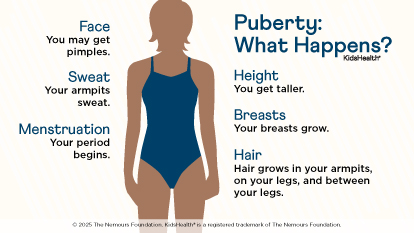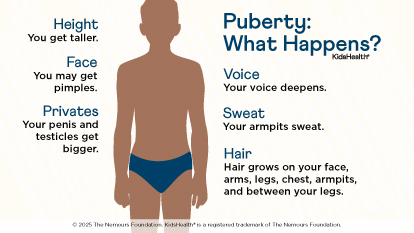- Parents Home
- Para Padres
- A to Z Dictionary
- Allergy Center
- Asthma
- Cancer
- Diabetes
- Diseases & Conditions
- Doctors & Hospitals
- Emotions & Behavior
- First Aid & Safety
- Flu (Influenza)
- Food Allergies
- General Health
- Growth & Development
- Heart Health & Conditions
- Homework Help Center
- Infections
- Newborn Care
- Nutrition & Fitness
- Play & Learn
- Pregnancy Center
- Preventing Premature Birth
- Q&A
- School & Family Life
- Sports Medicine
- Teens Home
- Para Adolescentes
- Asthma
- Be Your Best Self
- Body & Skin Care
- Cancer
- Diabetes
- Diseases & Conditions
- Drugs & Alcohol
- Flu (Influenza)
- Homework Help
- Infections
- Managing Your Weight
- Medical Care 101
- Mental Health
- Nutrition & Fitness
- Q&A
- Safety & First Aid
- School, Jobs, & Friends
- Sexual Health
- Sports Medicine
- Stress & Coping
13 Year Well-Child Checkup
What Happens at the Visit?
At your 13-year-old’s well-child visit, your doctor or nurse will likely check your teen’s:
- weight, height, and body mass index (BMI) and refer to a growth chart
- blood pressure and sometimes hearing
You can also expect health care providers to:
- Do an exam. This includes looking at the skin, listening to the heart and lungs, checking the back for any curves in the spine, and noting any signs of puberty. A parent or caregiver should be in the exam room during this part. Have siblings stay in the waiting room to give your teen privacy.
- Update vaccines. Vaccines can protect people from serious illnesses, so it's important that your 13-year-old gets shots on time. Vaccine schedules can vary from office to office, so ask your doctor what to expect.
- Look for signs of depression. These can include being easily annoyed, sad, or no longer interested in activities you used to like; having poor grades; and talking of suicide.
- Order tests. Your doctor may check for anemia, high cholesterol, tuberculosis, and sexually transmitted diseases (STDs) and order tests, if needed.
How Is My Child Developing at Age 13?
By age 13, it's common for teens to:
- show signs of puberty:
- In girls, puberty usually begins when they're between 8 and 13 with breasts and pubic hair starting to grow. Periods tend to begin about 2 years after breasts start to develop.

- In boys, the first sign of puberty is testicles getting bigger. This happens around age 11 but may start as early as 9 and as late as 15. Then the penis gets longer and pubic hair grows

- In girls, puberty usually begins when they're between 8 and 13 with breasts and pubic hair starting to grow. Periods tend to begin about 2 years after breasts start to develop.
- have oily skin and/or acne
- not always connect their actions to what could happen in the future
- want to be independent and fit in with peers
- focus on how they look and act
- be interested in risky behaviors
How Can 13-Year-Olds Stay Healthy?
Exercise
Teens need about 60 minutes of physical activity each day. Make sure your child wears the right safety gear during sports and activities. Kids are more likely to be active if they’re not in front of a screen. So set daily limits on screen time, including TV, video games, smartphones, tablets, and computers.
Healthy Eating
Teens should start making healthy food choices on their own. Encourage your child to eat five servings of fruits and vegetables each day and limit sweet, salty, and fatty foods.
Calcium and vitamin D are important for bone growth during growth spurts. Have teens aim for 1,300 milligrams of calcium each day. They can get this in three servings of low-fat dairy products or nondairy milk that’s fortified (has extra vitamins and minerals, like calcium).
Sleep
Teens need about 8–10 hours of sleep each night. Poor sleep is common and can hurt grades and how well teens play sports. Changes in the body make teens want to stay up later, but early school start times can make it hard for them to get enough sleep. Encourage your child to follow a relaxing bedtime routine, and keep TVs and other electronic devices out of the bedroom.
How Else Can I Help My Child?
Here are some things to keep in mind until your teen's next checkup at age 14:
School
- Encourage your teen to try different activities, like music, arts, sports, afterschool clubs, and other things to keep them active.
- Praise kids when they do something well. Support them in areas where they have trouble.
- Provide a quiet place to do homework. Help your child focus by putting things like TV, phones, and other devices away. As schoolwork gets harder, teens may struggle. If this happens, work with the school staff to find the cause, like a learning problem or an attention problem, bullying, or other stressful things.
- Know who your teen spends time with and make sure that an adult keeps an eye on them. Peer pressure can lead to risky behaviors, like drinking and smoking.
Self
- Spend time with your child every day. Eat meals with each other, be active together, and talk about things that are important to your teen.
- Set rules and explain what you expect. Praise good choices but have fair consequences if your child breaks rules.
- Prepare to answer questions about puberty and the feelings linked to those changes. Be open to questions about gender identity and sexuality. Ask your child to come to you with questions. Encourage teens to wait until they’re older before they become sexually active. Explain the risks of STDs and accidental pregnancy, and how to protect themselves.
- Have teens bathe or shower each day and use a deodorant. They should also brush their teeth twice daily, floss once a day, and see a dentist every 6 months.
- Look for signs of depression.
Safety
- Talk about the dangers of smoking, vaping, alcohol, and drugs. Keep alcohol and prescription medicines locked away.
- Have teens always wear a seatbelt while in a vehicle. Tell them to never get in a car with a driver who has been drinking or doing drugs. Instead, let them know to always call you for help.
- Remind teens to wear a helmet while riding a bike, skateboard, or scooter. It’s also important to use the right protective equipment, like mouth guards and pads, when playing sports.
- Don’t let your teen ride on an all-terrain vehicle (ATV).
- Have teens put on a sunscreen of at least SPF 15 at least 15 minutes before going outside. They’ll need to put on more about every 2 hours and after swimming.
- Monitor internet use. Keep family computers or tablets in a place where you can watch what your teen is doing. Talk with your teen about online safety, cyberbullying, and using social media wisely.
- Prevent gun injuries by not keeping a gun in your home. If you do have a gun, keep it unloaded and locked away. Bullets should be locked up separately. Make sure kids can't get to the keys.
- Talk with your doctor if you're concerned about your living situation. Do you have the things that you need to take care of your child? Do you have enough food, a safe place to live, and health insurance? Your doctor can tell you about local resources or refer you to a social worker.
These checkup sheets are consistent with the American Academy of Pediatrics (AAP)/Bright Futures guidelines.

© 1995- The Nemours Foundation. KidsHealth® is a registered trademark of The Nemours Foundation. All rights reserved.
Images sourced by The Nemours Foundation and Getty Images.
